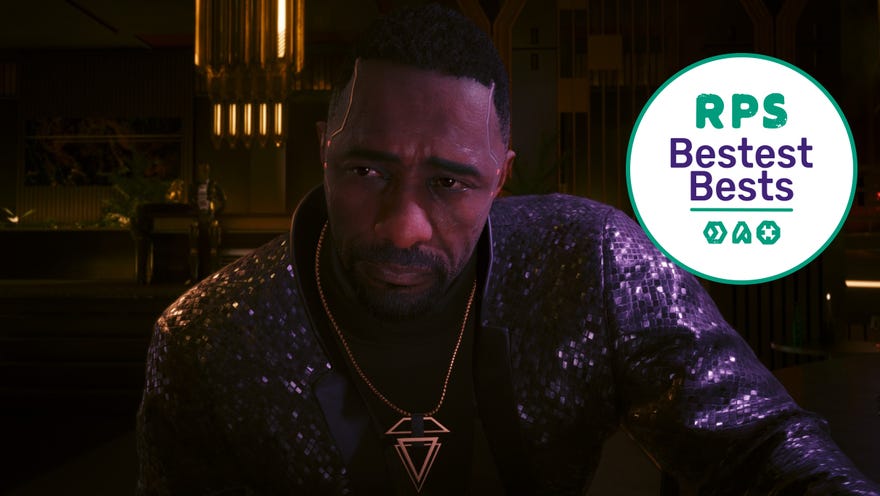Cyberpunk 2077: Phantom Liberty review: perhaps the best expansion pack ever made
You only live twice
Cyberpunk 2077's triumph was that it offered a sprawling story, dozens of hours long, which cohered around just a small number of themes. Or maybe even a single thesis: that the cynical, defensive, self-centred voice in your head - personified by ancient, soul-trapped, anarcho-rockstar Johnny Silverhand - offered only a literal dead-end, and that real rebellion in the face of a messed-up world lay in helping friends. It was Frank Capra with robot arms and samurai swords, and I ate it up.
V doesn't go to Washington in Phantom Liberty, but Washington comes to her. CD Projekt Red's major expansion to the first-person RPG opens up a new district and a new cast of characters, including the President of the New United States and an aging sleeper spy played by Idris Elba. The themes remain the same, but the thesis is being tested: how can you help your friends if you don't know who they are, and if their goals are mutually exclusive?
Long before you need to think about that, you'll meet Songbird. She's a government hacker, and she'll call you with a job around two-thirds of the way into Cyberpunk 2077's main storyline - or immediately, if you chose to skip direct to Phantom Liberty's missions from character creation.
The job involves heading to Dogtown, a previously inaccessible district of Night City that is under control of Barghest, a private army led by former NUSA soldier Colonel Kurt Hansen. The police don't go there and entry is strictly controlled, but the bait for V is that Songbird says she can fix the chip in your head - the one that allows you to have regular pow-wows with Keanu Reeves, and the one that is killing you.
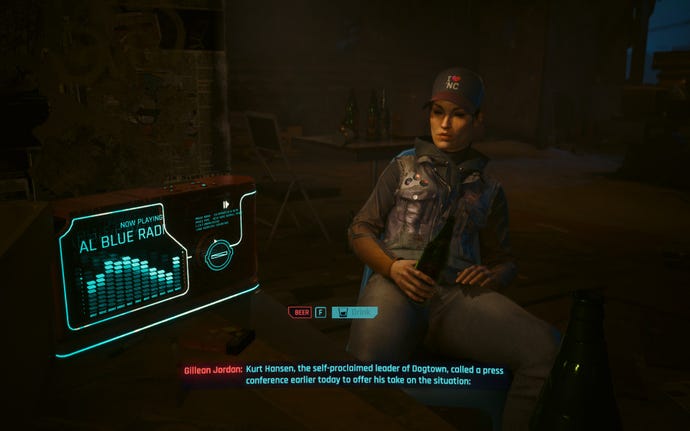
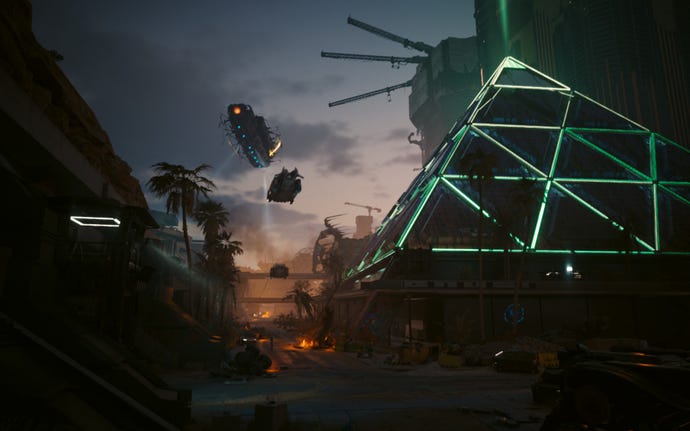
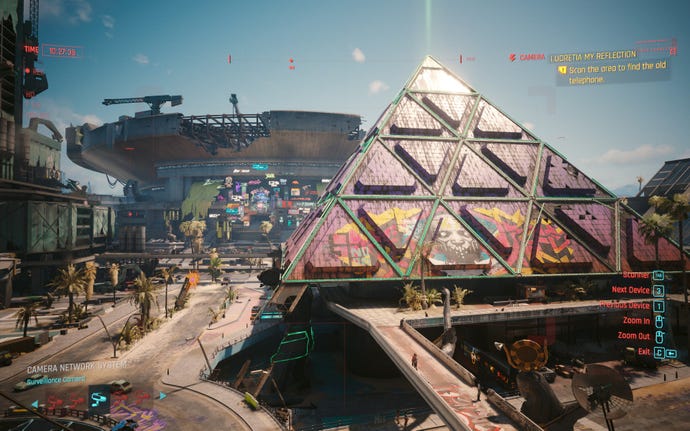
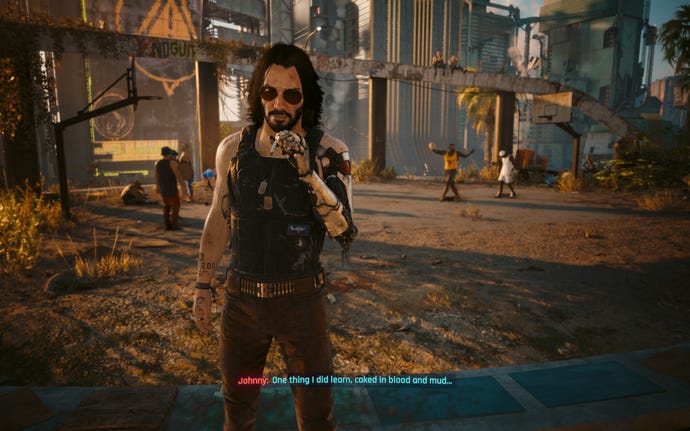
The bait for players is that Dogtown is perhaps the most dense Cyberpunk district yet. After a brief sequence in the abandoned parking structure of a half-completed sports stadium, you'll emerge into the market now held in what was once the stadium's concourse. I can only compare this stepping-out to my first moments in Half-Life 2's City 17, nearly twenty years ago, when a surveillance droid, Dr. Breen public service announcements, and a taunting Combine soldier let me know I'd arrived in a new world.
Dogtown's market does the same thing, but to 2023 standards. The cries of street hawkers rise above the blaring news reports playing from TV screens positioned above the countertop of a noodle bar behind which the cooks shake and stir their pans. A jawless cyborg wishes to show you his elbow flamethrowers, a couple of familiar-looking braindance salesmen are plotting revolution from the back of their renovated van buried under a mountain of trash, and a kid stands on a stool so he can be seen from behind the table where he advertises his preem cyberware. In the spaces between these vendors, there are people everywhere - eating, drinking, spraypainting, dancing, chatting, perusing, sleeping, or just passing through.
Then you step out again - or rather, slide, in a manner I won't spoil - into the streets of Dogtown outside. What strikes you first is maybe the glowing pyramid, which you'll later learn houses a nightclub, or maybe the floating barge in the sky with the giant picture of Kurt Hansen's face on the side, which you'll learn has a habit of drifting into the background of scenes as a reminder of where you're headed.
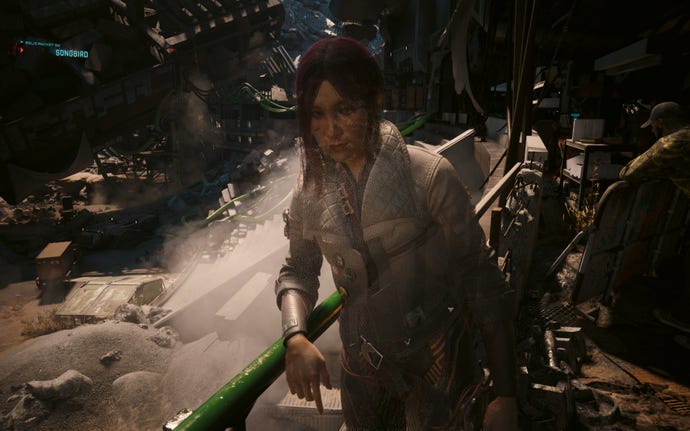
Narrative urgency takes over at this point, and you're away - meeting next the President, and then Solomon Reed, the spy played by the aforementioned Elba. You'll spend a lot of your time in Phantom Liberty talking to these characters and others, and the writing and performances are as strong or even stronger than they were in the original game.
It's hard to talk about why without spoilers, particularly since Phantom Liberty's set-piece missions are as likely to feature interesting, high-stakes conversations as they are combat scenarios. There's one particular mission which hits peak Bond as you infiltrate an exclusive high society party, talk your way out of trouble with a suspicious villain, then play several games of roulette as you attempt to con information out of two arms dealers. Each new conversation ratchets up the tension, and when that tension is broken halfway through the mission it's by a musical performance, not a gunfight.
While Phantom Liberty hits these spy-thriller marks well, I was most struck by how natural and human Cyberpunk's characters seem in smaller, intimate moments. I got to know the President of the NUSA while sipping beers and listening to the radio together, and I danced and shared dreams with a spy looking for a way out on the night before a big op. It helps that almost all of the characters you meet already know each other before you show up, which means that the exposition - about political manoeuvring, corporate wars, undercover ops gone wrong - is always made to feel personal. None of this ought to be as remarkable as it is, but Phantom Liberty manages to make worldbuilding, level design, and writing work together, cyberhand in powerglove, like few other big budget games do.
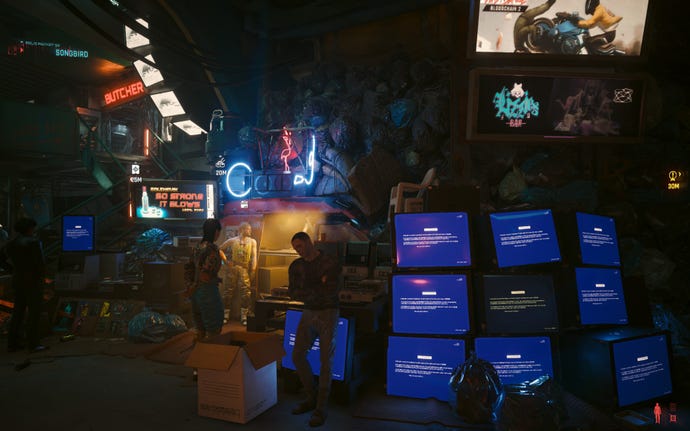
When it is time for the talking to stop, there's combat and stealth and hacking, all of which are improved by the free-to-all Update 2.0 and its entirely revamped RPG systems. Perks are the most obvious beneficiary: gone are the umpteen percentage stat increases that reduced the time it took to aim down sights by 10% or increased your SMG accuracy by 3%. Now, a perk tree such as Reflex offers the ability to air-dash and to block bullets with a sword, and percentage increases are mostly confined to satisfying, stackable methods of, say, regaining stamina for dismembering people.
The changes to all of these progression systems are substantial enough that booting up an old save post-patch leads to all your previous upgrade points being refunded so you can re-invest them, and a Ripperdoc inviting you to come in and reimplement your newly rebalanced cyberware. Whatever choices you make with your do-over, it seems much easier to craft a coherent character build. I respecced from Hugh Jackman in Swordfish to Gerard Butler in literally any Gerard Butler film and I didn't regret it. It's even worth visiting a wardrobe, since clothes are no longer a form of armour and you therefore no longer need to dress like John le Carré's Biker Hippie Rodeo Clown just to get a few extra stat points.
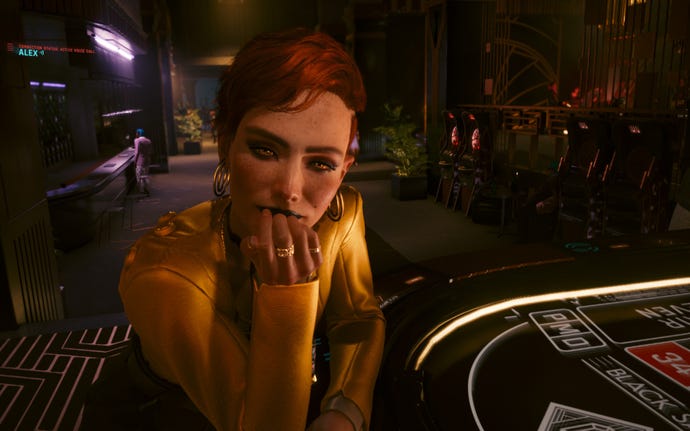
Is it fair to judge this free update in a review of the paid expansion? I'm not sure. For Phantom Liberty's part, it adds a sixth perk tree, Relic, with its own upgrade points. Relic offers different options for different playstyles, with abilities that enable auto-cloaking and vulnerability detection, although the main appeal for me is an upgrade to arm cyberware that makes punching people with your robot arms until they burst a viable tactic.
With or without the expansion, and even as someone who enjoyed Cyberpunk 2077 upon release, it's clearly now much improved. Does that mean that Update 2.0 and/or Phantom Liberty make Cyberpunk 2077 perfect, or even bug free? No and no. I experienced, for example, a handful of animation glitches and one instance in which Idris Elba got stuck during a scripted combat encounter and I needed to reload to the last save. What's changed, in my view, is that these issues now exist within acceptable bounds. I no longer feel like I have to caveat all my praise for the things the game gets right.
And it gets a lot right. When Phantom Liberty was first announced, I was a little disappointed that it wasn't continuing V's story onwards from the end of Cyberpunk 2077. Given all that ending entails, or can entail, I couldn't see how a mid-game expansion could add anything of narrative significance. I needn't have worried. One of Phantom Liberty's great strengths is that, despite Dogtown's secure borders, it isn't ringfenced in any way from the rest of the story. You can leave Dogtown midway to take on a few missed sidequests, or give your gal Judy a call to discuss what you got up to with the President the night before. The result is an expansion that reflects, refracts and enriches the game around it. If you've never played Cyberpunk 2077 before and buy the expansion, Phantom Liberty is an absurdly lush, thrilling, 20-hour-long side quest; if you have played it before, it's an unmissable opportunity to check in on old friends, and to make a few new ones, in Night City.
This review is based on a review build of the game provided by developers CD Projekt Red.
